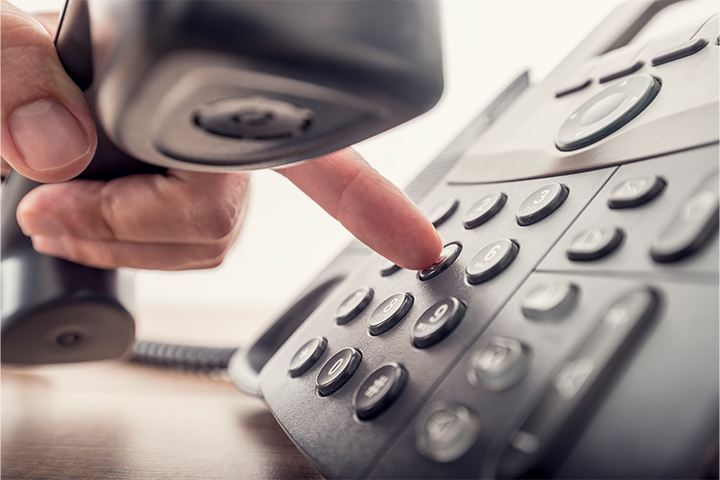GP cautioned over telehealth consult after patient complains
Avant media
Monday, 7 March 2022

Telehealth consultations are now the norm for most doctors, as technology improvements allow doctors and patients to effectively interact through the tailored platforms.
However, as one GP member was reminded, doctors must adhere to the same standards as a face-to-face consultation. This includes; always taking a full medical history and documenting the discussions, especially when seeing a new patient.
Video telehealth consultation
In this case, the GP was conducting a telehealth consultation through a national mobile app service. The patient, based interstate, was required to complete a health summary which included their personal details, medical history, current medications and presenting symptoms via the app for the GP to review ahead of the consultation.
In terms of her medical history, the patient said she had undergone breast surgery, had asthma and allergies to latex and codeine. She also stipulated she was not taking any medications.
Using the chat function, the GP and patient exchanged messages before the consultation, and the patient advised that she had gained 25 kg in a year despite having a reasonably good diet and doing physical activity.
The GP asked the patient if she had seen a dietician. The patient said no but indicated that she ate well. He asked for her height and weight and calculated her BMI to be 30-31.
Still via the chat function, with the information provided, the GP suggested she could try the appetite suppressant, Duromine. The patient researched the medication and said that she wanted to try it.
The GP then started the video telehealth consultation and went into more detail about Duromine, explaining that combined with a good diet, it could help reduce her BMI. He told her to take it for a few days to see how she tolerated it and provided one month’s supply with a starting dose of 30mg. He also advised the patient not to drink alcohol while taking the medication and strongly recommended she see a dietician.
Patient complaint
The GP did not see the patient again and later received a complaint notification from Ahpra.
The patient had complained claiming the GP did not perform a proper assessment and she should not have been prescribed Duromine due to her history of anxiety. She stated her mental health suffered significantly, experiencing panic attacks and ruminating, obsessive paranoid thoughts, and developed behavioural symptoms, including picking her skin and pulling her hair.
Ahpra acknowledged the patient’s dissatisfaction with the treatment the GP provided and recognised that the experience was disappointing for her. They proposed a caution and mentoring conditions for unsatisfactory performance in relation to providing weight loss management, prescribing principles, communication and record keeping.
Response to Ahpra
The GP, with Avant's support, submitted a written response to Ahpra. In the response, the GP admitted he was under a lot of stress at the time of the consultation, and he did not conduct a thorough consultation as he would usually do. He apologised for the extreme anxiety the patient experienced from taking the medication but said she did not disclose her history of anxiety, and if she had, he would not have prescribed Duromine.
The GP also reflected on his practice and sought ways to improve it. He completed eight hours of education on weight loss management, prescribing principles relating to weight loss, and communication and record-keeping.
The final decision
Ahpra found the GP’s performance during this telehealth consultation fell below the expected standard and was unsatisfactory because:
- He failed to take the patient’s full medical history.
- He did not write a referral to a dietician himself.
- The messages between him and the patient were brief, and he did not perform a complete assessment before deciding a prescription for Duromine was appropriate. Instead, this was suggested as the first line of management and no other options were explored.
- There was a lack of any medical records.
Ahpra upheld their decision to caution the GP and imposed conditions on his registration for six months, requiring him to undertake mentoring on comprehensive patient assessment and communication.
Key lessons
Telehealth technology advancements provide patients and doctors with the availability to easily transfer information, but doctors must adhere to the same standards as if conducting a face-to-face consultation.
You are required to keep an appropriate record of the consultation. If the telehealth platform does not allow you to save your notes or messages with your patient via the chat function to the medical record, make sure you document the consultation in a separate patient record.
If you are seeing a patient for the first time, and you don’t have access to their medical records, take a full medical history and probe for more information before offering treatment options. The Medical Board’s Guidelines for technology-based patient consultations require you to communicate with your patient to ensure that the proposed treatment is not contraindicated. This particularly applies to telehealth consultations when the practitioner has no prior knowledge or understanding of the patient’s condition(s) and medical history or access to their medical records.
When considering prescribing a medication such as Duromine, ensure your patient has no contraindications, is fully aware of the side-effects and advise them of any alternatives.
If appropriate, write a referral to another healthcare practitioner, don’t just suggest the patient see one, for example, in this case a dietician.
Finally, remember the Medicare Benefits Scheme item numbers define telehealth consultations as involving an audio and/or video link, not online chat consultations.
Useful resources
Factsheet: Conducting a telehealth consultation
Podcast: Tips when seeing a new patient via telehealth
Medical Board Guidelines: Guidelines for technology-based patient consultations
MBS (Medicare Benefits Schedule): MBS Telehealth Services from January 2022
More information
For medico-legal advice, please contact us on nca@avant.org.au or call 1800 128 268, 24/7 in emergencies.